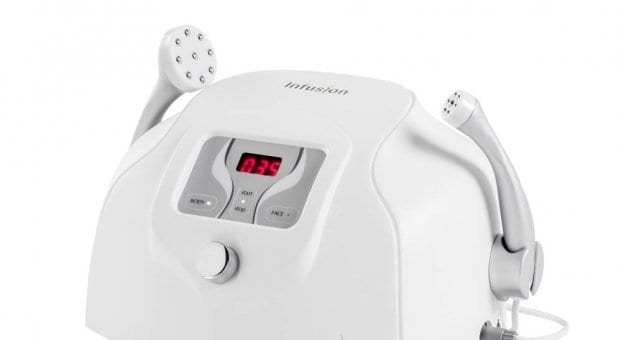I brought a colleague along to my Infusion appointment. Being a self-diagnosed agliophobe (look it up — you probably are, too), my plan was simple: let Sarah go first. If she screamed in pain or her face fell off, I’d say, “I’ve got what I need” and run. If not, I’d give it a go. Lucky for Sarah, my fears were for naught.
Infusion electro-mesotherapy is Viora’s new trans-dermal system, designed to address an array of aesthetic needs. If that looks like Greek to you, let me give it to you in gayman’s terms. Basically, when paired with a specific solution, or ampoule, the electric current delivered by the sci-fi-looking device produces benefits ranging from wrinkle reduction and skin firming to collagen regeneration. In super-gayman’s terms, it’s a quick way to go from looking tired to twinky.
In the interest of seeing instant, dramatic results, Sarah and I were treated to the intensive-hydration treatment. In this case, the ampoule is hyaluronic acid, a natural substance found in abundance in nice skin and used commonly in mesotherapy treatments. Unlike traditional treatments, which use needles to inject all of these beneficial ingredients under your skin, Infusion does it a little differently.
“Once these currents come in contact with your skin, the skin’s cells open up microchannels, and it’s able to penetrate all of these active ingredients into your dermis without having to use needles,” explains Kara Moncrief, clinic trainer for Viora.
Well, sounds promising.
Now if you’re anything like me, you’re still hung up on the word electro. While this treatment is being touted as painless and perfect for pre-event, I was skeptical. What can I say? I like my face. So naturally, I did what any man would do and let Sarah go first.
Starting out, Kara coats her face with the hyaluronic acid. She grabs the Infusion instrument and calmly turns the dial. Cue electric hum and heart palpitations. “Tell me how this feels,” she says calmly, while placing it gingerly on Sarah’s face. “Fine,” says she. Kara gives me a reassuring look and turns up the dial, asking again about Sarah’s comfort level. This process continues until Sarah says that she can definitely feel it but that it doesn’t hurt. Kara expertly guides the instrument around Sarah’s face for about half an hour, explaining the benefits, the evolution and the science behind the procedure. I am mesmerized.
After finishing with the lips, Sarah is done. As I live and breathe, all we were told is true! The results are instant. Sarah’s super pretty to start, but her skin has a new lustre, a sheen and plumpness, a youthful, refreshed quality that one can only describe (as I am informed by the Viora team) as positively dewy. I don’t know if that’s a word, but it’s bang-on.
I won’t go into all the details of my turn, as it is more of the same, but I feel the need to send some comfort out to my fellow agliophobes. Not only does this treatment not hurt, it actually feels kind of awesome. Imagine the feeling of pins and needles travelling across your face, gently waking up your cells and telling them to get to work. Telling them, ‘It’s time to get dewy.’
There’s lots to say about the other treatments offered by Viora, including the skin tightening and the diamond-tip microdermabrasion, but there’s not enough room here. Check out the physician locator on the website, and stay tuned for more health and beauty tips!
vioramed.com

 Why you can trust Xtra
Why you can trust Xtra


